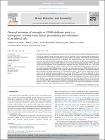| dc.contributor.author | LYNCH, MARINA ANNETTA | en_US |
| dc.date.accessioned | 2013-09-25T15:31:01Z | |
| dc.date.available | 2013-09-25T15:31:01Z | |
| dc.date.issued | 2013 | en_US |
| dc.date.submitted | 2013 | en_US |
| dc.identifier.citation | Denieffe S, Kelly RJ, McDonald C, Lyons A, Lynch MA, Classical activation of microglia in CD200-deficient mice is a consequence of blood brain barrier permeability and infiltration of peripheral cells., Brain, behavior, and immunity, 34, 2013, 86-97 | en_US |
| dc.identifier.other | Y | en_US |
| dc.identifier.uri | http://hdl.handle.net/2262/67439 | |
| dc.description | PUBLISHED | en_US |
| dc.description.abstract | The interaction between CD200, expressed on several cell types, and its receptor CD200R, expressed on cells of the myeloid lineage, has been shown to be an important factor in modulating inflammation in macrophage function in several conditions including colitis and arthritis. More recently its modulatory effect on microglial activation has been identified and CD200-deficiency has been associated with increased microglial activation accompanied by increased production of inflammatory cytokines. The response of glia prepared from CD200-deficient mice to stimuli like lipopolysaccharide (LPS) is markedly greater than the response of cells prepared from wildtype mice and, consistent with this, is the recent observation that expression of Toll-like receptor (TLR)4 and signalling through NF?B are increased in microglia prepared from CD200-deficient mice. Here we show that glia from CD200-deficient mice are also more responsive to interferon-? (IFN?) which triggers classical activation of microglia. We investigated the effects of CD200-deficiency in vivo and report that there is an increase in expression of several markers of microglial activation including tumor necrosis factor (TNF)-?, which is a hallmark of classically-activated microglia. These changes are accompanied by increased IFN?, and the evidence suggests that this is produced by infiltrating cells including T cells and macrophages. We propose that these cells enter the brain as a consequence of increased blood brain barrier (BBB) permeability in CD200-deficient mice and that infiltration is assisted by increased expression of the chemokines, monocyte chemotactic protein-1 (MCP-1), IFN?-induced protein-10 (IP-10) and RANTES. This may have implications in neurodegenerative diseases where BBB permeability is compromised. | en |
| dc.description.sponsorship | This work was supported by grants obtained from Science
Foundation Ireland and the Health Research Board (Ireland). RK
was the recipient of funding from the Dublin Region Higher Educa-
tion Alliance funded by the Strategic Innovation Fund (Cycle 2;
grant code) from the Higher Education Authority | en |
| dc.format.extent | 86-97 | en_US |
| dc.language.iso | en | en_US |
| dc.relation.ispartofseries | Brain, behavior, and immunity | en_US |
| dc.relation.ispartofseries | 34 | en_US |
| dc.rights | Y | en_US |
| dc.subject.other | Blood brain barrier permeability | |
| dc.title | Classical activation of microglia in CD200-deficient mice is a consequence of blood brain barrier permeability and infiltration of peripheral cells. | en_US |
| dc.type | Journal Article | en_US |
| dc.type.supercollection | scholarly_publications | en_US |
| dc.type.supercollection | refereed_publications | en_US |
| dc.identifier.peoplefinderurl | http://people.tcd.ie/lynchma | en_US |
| dc.identifier.rssinternalid | 88047 | en_US |
| dc.rights.ecaccessrights | OpenAccess | |




